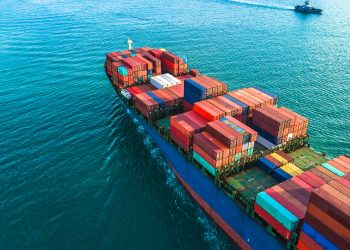There have been no comprehensive statistics kept
 Proper cargo loading and stowage of containers is very important to the safety of acontainer ship, its cargo and its crew, to shore-based workers and equipment, and to theenvironment. Even with proper loading of the cargo into the container and secure stowageaboard ship, a number of factors ranging from severe weather and rough seas to morecatastrophic and rare events like ship grounding or collision can result in containers being lostoverboard while at sea.
Proper cargo loading and stowage of containers is very important to the safety of acontainer ship, its cargo and its crew, to shore-based workers and equipment, and to theenvironment. Even with proper loading of the cargo into the container and secure stowageaboard ship, a number of factors ranging from severe weather and rough seas to morecatastrophic and rare events like ship grounding or collision can result in containers being lostoverboard while at sea.
A question which has deserved an informed answer is: How many containers actuallyare lost at sea? The World Shipping Council (WSC) has seen various statements in public thatthe industry loses 10,000 containers a year at sea. The WSC understood that this number isgrossly excessive and concurs with the statement of the National Cargo Bureau: “there havebeen no comprehensive statistics kept, as to the number of containers lost overboard.”
In an effort to shed greater clarity on the issue, the WSC undertook a survey of itsmembers to obtain a more accurate estimate of the number of containers lost overboard on anannual basis. The WSC’s members represent over 90 percent of the global containershipcapacity. Members were asked to provide the actual number of containers lost overboard forthree previous consecutive years. Those carriers that responded represent over 70 percent ofthe global container ship capacity. WSC assumed for the purpose of this analysis that thecontainer losses for the 30% of the industry that did not respond to the survey would beroughly the same as the 70% of the industry that responded.
As a result, the total annualfigure reported has been adjusted upward to provide an estimated loss figure for all carriers,both WSC members and non-members, and arrive at a total industry figure. Some carriersreported that they lost no containers during the period, while others noted a catastrophic loss,which for the purposes of this analysis was defined as a loss overboard of 50 or morecontainers in a single incident. Catastrophic losses are rare. The number of containers lost in acatastrophic event can vary greatly — from 50 to several hundred.
Based on the survey results, the World Shipping Council estimates that on average thereare approximately 350 containers lost at sea each year, not counting catastrophic events. When one counts the catastrophic losses, an average total loss per year of approximately 675containers was observed.
Total industry losses obviously vary from year to year, but these numbers are well belowthe 2,000 to 10,000 per year that regularly appear publicly, and represent a very small fractionof container loads shipped each year. (2)Nevertheless, the industry continues to pursuemeasures to reduce the number of containers lost overboard to zero.
Containers lost overboard as a result of events related to severe weather are usuallyoutside the control of carriers, stevedores, or shippers, and unfortunately, such events areunlikely to disappear completely. But the industry has been supporting a number of effortsundertaken in recent years to reduce the number of containers lost at sea. One effort is thejoint industry/government project, called Lashing@Sea, led by the Maritime Research Instituteof the Netherlands (MARIN).
Another effort is the joint publication of Safe Transport of Containers by Sea: IndustryGuidance for Shippers and Container Stuffers by the International Chamber of Shipping (ICS) andthe World Shipping Council (WSC), which provides recommended best practices for ships, portfacilities, and shippers in the loading and handling of cargo containers.
A related effort is the joint decision by the International Maritime Organization (IMO),the International Labour Organization (ILO), and the United Nations Economic Commission forEurope (UNECE) to develop an IMO/ILO/UNECE code of practice for packing of cargo transportunits, including containers. The WSC participates in a group of experts tasked with preparingrecommendations on the draft code of practice with a target publication date in 2013.
A further, very positive development is the agreement by the International Maritime Organization to undertake a review of the issues involved, including agreement to consider theproposal of the WSC and ICS to require that the actual weight of every loaded container beverified and provided to the vessel operator prior to stowing aboard a ship, becausemisdeclared container weights have contributed to the loss of containers overboard, as well asto other safety and operational problems. In September 2011, the IMO will begin considerationof this proposal.
Any loss of a cargo container overboard is a loss that carriers diligently seek to prevent. While the actual number of containers lost at sea is dramatically less than most publicstatements have indicated, the industry’s goal is to reduce those losses to as close to zero aspossible.
Source: World Shipping Counil





























































